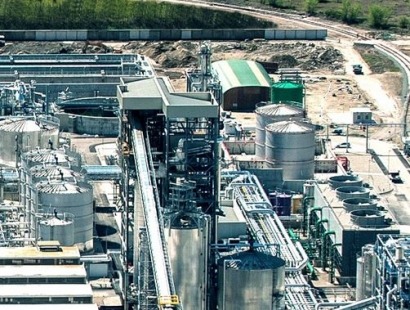
Among those on hand for the celebration were Flavio Zanonato, Italy's Minister for Economic Development; Roberto Cota, the president of regional administration, Crescentino Mayor Marinella Venegoni, and Carlo Riva Vercellotti, president of the provincial administratio).
The €150 million Crescentino (Vercelli) bio-refinery is owned by Beta Renewables, a joint venture between Biochemtex, a Mossi Ghisolfi Group engineering company, the American fund TPG (Texas Pacific Group), and the Danish company Novozymes, a world leader in bio-innovation.
The project was supported by the European Commission within the 7th Framework Programme for Research and Technological Development.
The bio-refinery, with a footprint of 15 hectares, has a production capacity of 75 million litres a year of second generation bio-ethanol intended for the European market. The facility's owners said the plant is entirely self-sufficient in terms of energy consumption (13 MW of electricity produced from lignin) and does not discharge any wastewater, ensuring 100% water recycling.
But the facility's environmental benefits are only part of the story, the partnership said.
They contend the bio-refinery 's most “revolutionary” feature is the technology platform it relies on to create bio-ethanol.
The PROESATM (PROduzione di Etanolo da biomasSA - Production of ethanol from biomass) technology combined with Cellic® enzymes produced by Novozymes makes use of sugars that are present in lignocellulosic (non-food) biomass to obtain alcohol, fuel and other chemical products with low emissions of greenhouses gases at competitive costs, compared to fossil fuels.
Moreover, they said, the PROESA technology produces bio-fuels that ensure a reduction in greenhouse gas emissions close to 90% of those generated by fossil fuels, substantially better that the reduction achieved by first-generation bio-fuels.
“Investors interested in cellulosic ethanol often ask when the technology will be ready at commercial scale,” said Guido Ghisolfi, CEO of Beta Renewables. “PROESA enables customers to produce advanced bio-fuel at a cost-competitive price relative to conventional bio-fuels – at large-scale and today.
"Our complete offering makes cellulosic bio-fuel projects bankable and replicable. With the world’s first commercial plant up and running here in northern Italy, I very much look forward to an exciting journey of establishing an entirely new, and very promising, industry,” Ghisolfi said.
Peder Holk Nielsen, CEO of Novozymes, said he sees the opening of the plant as a reminder to the policy makers that the successful development of renewables-based projects depends on stable and predictable, blending mandates, incentives for the collection of agricultural residues, and investment support for the first large-scale plants.
"Continued reliance on fossil fuels is not viable,” Nielsen said.
"Large scale production of low cost sugars from non-food biomass is a critical enabler to accelerate the growth of bio-chemicals and bio-fuels", said Geoffrey Duyk, MD, PhD, Managing Director and Partner at TPG. "We are very excited to see the technology deployed worldwide, leveraging the most cost effective source of biomass specific to each region, including dedicated crops and agriculture waste."
The Crescentino bio-refinery is situated in a territory whose strong agricultural vocation allows to exploit an extensive variety of biomasses that are available at a low cost within a 70 km range from the plant (principally rice straw, which is plentiful in the area).
The company is also developing a dedicated production line fuelled by giant cane (Arundo Donax), which can be cultivated on marginal land, without affecting the agricultural food production.
The PROESATM technology was developed by Biochemtex at the Rivalta Scrivia Research Centre in Alessandria, Italy.
The Research Centre, which is entirely dedicated to renewable sources, started a pilot plant for bio-fuel production in 2009.
“The second generation bio-fuel market has high economic and occupational potential, considering the know-how of our companies and the directives issued by the European
Commission on the subject,” Ghisolfi said. “We shall continue to invest in research because we believe that sustainable chemistry is one of the key sectors for the Country's economic recovery. We are making a series of preliminary assessments in some areas in Italy that might prove to be strategic for the construction of new plants."
Ghisolfi went on to say the partnership is planning to open a new research centre and a demonstration plant in Modugno, near Bari, Italy, to produce intermediate chemical products starting from lignin, a byproduct of ethanol production.
"At the same time we shall continue to export our technology in the world through commercial agreements, since the demand for new generation bio-fuels is steadily expanding," he said.
For additional information:

